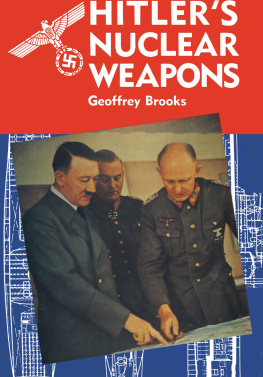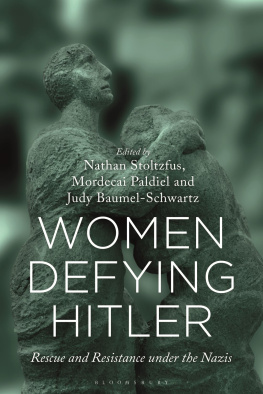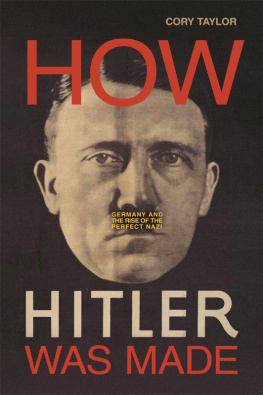HITLERS COMPROMISES
NATHAN STOLTZFUS
Hitlers Compromises
COERCION AND CONSENSUS IN NAZI GERMANY

Copyright 2016 by Nathan Stoltzfus.
All rights reserved.
This book may not be reproduced, in whole or in part, including illustrations, in any form (beyond that copying permitted by Sections 107 and 108 of the U.S. Copyright Law and except by reviewers for the public press), without written permission from the publishers.
Yale University Press books may be purchased in quantity for educational, business, or promotional use. For information, please e-mail (U.K. office).
Set in Scala and Scala Sans types by Westchester Publishing Services.
Printed in the United States of America.
Library of Congress Control Number: 2015959240
ISBN: 978-0-300-21750-6 (hardcover : alk. paper)
A catalogue record for this book is available from the British Library.
This paper meets the requirements of ANSI/NISO Z39.48-1992 (Permanence of Paper).
10 9 8 7 6 5 4 3 2 1
For Maria,
CONTENTS
PREFACE
I BEGAN PLANNING this book as I thought about how to guide a new generations learning about Hitlers dictatorship. I discovered that many in the classroom took the unfathomable brutality expressed in the Holocaust as characteristic of Nazi methods in all places; Hitlers dictatorship must have had the same cold-blooded approach to ruling the Germans at home. Some students were well aware of the unrestrained and brutal ways the German Army conquered and ruled populations during the war of annihilation in the East, but they mistakenly thought that this brutishness was typical of Nazi leadership within the Reich. While Hitler worked with a range of tactics, in search of consensus within the Reich, this book focuses on his willingness to compromise with the German people when the political stakes were high enough.
Nazi ideology held that providence had granted the German race a mandate to dominate all others. That was absolute. But Hitler and his circle did not suppose that they could beat eighty million Germans into accepting and carrying out all the implications of this ideology. Nazi leaders, especially Hitler as the peoples Leader, wanted the Germans to work together to build up the strength and unity of a Nazi national community. Except for a tiny fraction of the population, consisting of Jews, political dissidents, social outsiders, and the congenitally incurable, National Socialism strove to bring all Germans into line with the
As Himmler coached his SS men on how to kill, at Posen in October 1943, the architect of genocide presented a world populated by Germans and those they exploited. Always be clear about it: [the enemy] is a beast. One basic principle must apply: we must be honest, decent, loyal and comradely to those of our own blood and to no one else. Whether the other peoples live well or whether they die from hunger is important to me only in so far as we need them as slaves for our culture. The result, Himmler said, was a class of humane mass murderers: Most of you know what it is like when 100 corpses lie side by side, when 500 or 1000 lie there. To have experienced this and yetaside from exceptions due to human weaknessto have remained decent, that has hardened us.
In Nazi theory, the Germans together would perpetrate the terror and commit the horrible crimes for which Hitlers regime is known, only against all others. No German was required to commit murder, although the elite class was expected to do this with great aplomb, and one would have to keep ones mouth shut if one disapproved. This was a terrible price to pay for some, who could avoid being caught up in the persecuted fringe only by the terrible repression of their freedom to speak and act as they wished. It must be said that on the whole, however, Germans were grateful for the sense of security and stability that Hitler seemed to bring and were willing to give up their freedoms for it. Such a tradeoff is not at all uncommon in history, and the Germans had particularly strong reasons for feeling insecure. Germany had not been a democracy but still could have made the transition to it had it not been for the historical circumstances of World War I and its aftermath. In Europe, Germanys enemies, Britain and France, had the decisive advantage of winning that war. The war took on its own dynamic, demanding that new lives be sacrificed to give the many dead a reason for having died. When this justification of war sacrifices through victory did not happen for Germans, they were too easily convinced that they had been stabbed in the back and were beholden to refight the war to avenge the old loss.
Pursuing vindication, the Germans were able to advance so far during World War II only because they had liquidated the Jewish saboteurs and agitators, Himmler said. Hitlers ideological war in the East was a civilizing mission because the Germans, unlike the Russians and Slavs, maintained their superior nature while exterminating masses of people. This ideal is pictured in the Auschwitz album of carefree killers joking and posing for the camera as if it were just another happy moment together. The ideal of Germans supporting each other as the instrument of mass murder helps explain why the wife of Auschwitz commandant Rudolf Hss, who lived with the family in a villa at Auschwitz within sight of the camp from 1940 to 1944, thought of her life there as paradise, where she had wished to live till I die. In photographs her young children smile happily while at play in luxury in the shadow of infinite cruelty, and Hsss daughter remembers him as the nicest man in the world who was very good to us.
Rochus Misch, Hitlers bodyguard who died in 2013, said that Hitler wasnt a monster but a perfectly normal gentleman who spoke kind words to me. Then he asked a key question that lingers with us today: If Hitler really did all the terrible things people now say he did, how could he have been our Fhrer, the German Leader?it. Still today there are signs of a retrenchment among some historians, as well as in the official commemorations in Germany, in the comforting belief that Hitler ruled his own race of people by intimidation and terror more than by incentives and rewards, that the Gestapo crushed all opposition, and that the dictatorship set its course according to its ideology and proceeded in a straight path toward it, steamrolling any obstacles with brute force. Many today are inclined to believe such an argument. The history of popular protests during the Third Reich was repressed by the regime, and the remaining evidence of them has too often been routinely overlooked in the commemorations of the courageous and the rescuers. Although public social opposition without punishment was possible, such resistance by ordinary persons is easily construed as a rebuke to the vast, overwhelming majority who did nothing, a mechanism illustrated by the decades-old reluctance of the Federal German Republic to rehabilitate the outstanding men sentenced to death by the Nazis for undermining German morale or refusing to fight the criminal war.
Only healthy, productive German-blooded persons experienced the methods and the timing of Hitlers dictatorship in the ways that some scholars today describe as characterizing soft dictators (see the introduction). Hitlers dictatorship was reassuring to most Germans for about nine of its twelve years, and there were many who believed, like Hitler, that the Reich would prevail in the end if the Germans only remained united and willing to fight to the death. Many believed with Himmler that we will win the war. It is a law of nature.
Next page









